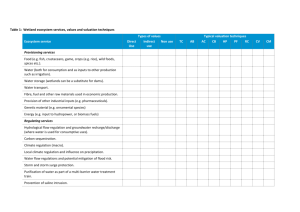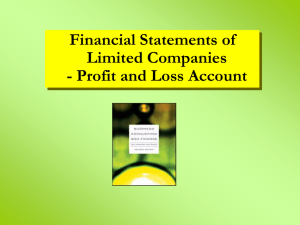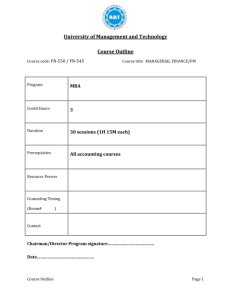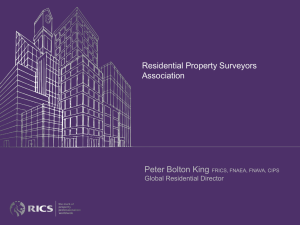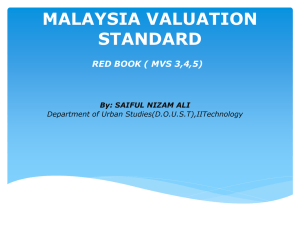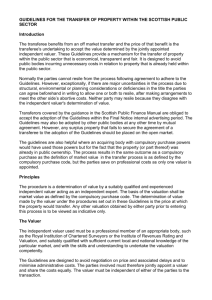the full article
advertisement
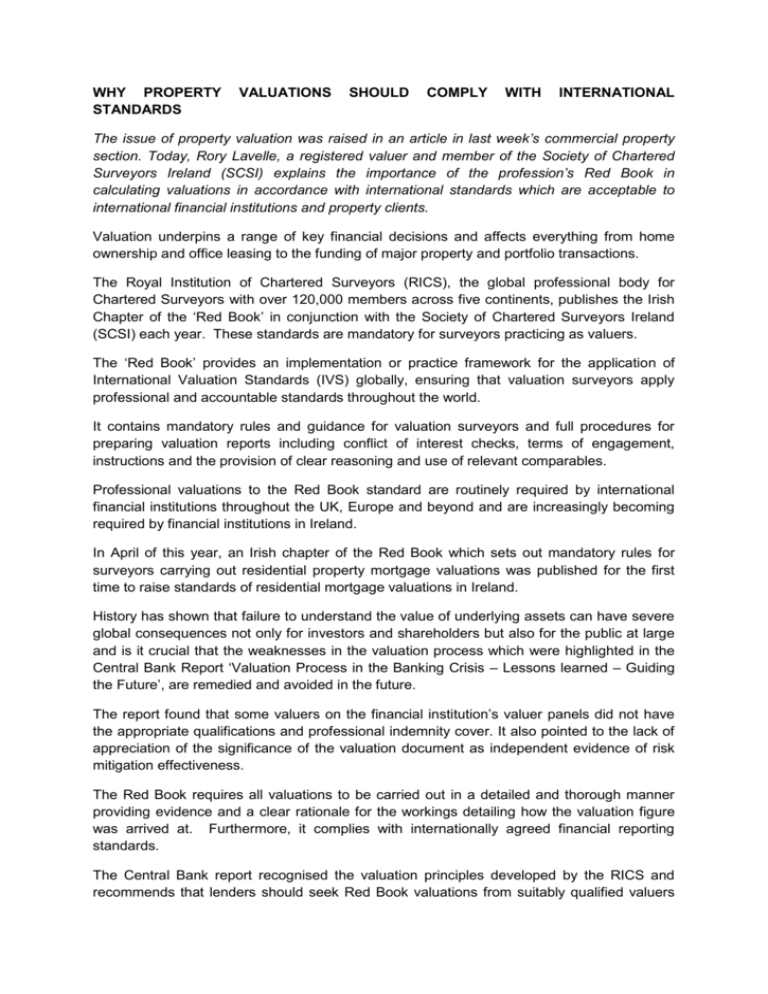
WHY PROPERTY STANDARDS VALUATIONS SHOULD COMPLY WITH INTERNATIONAL The issue of property valuation was raised in an article in last week’s commercial property section. Today, Rory Lavelle, a registered valuer and member of the Society of Chartered Surveyors Ireland (SCSI) explains the importance of the profession’s Red Book in calculating valuations in accordance with international standards which are acceptable to international financial institutions and property clients. Valuation underpins a range of key financial decisions and affects everything from home ownership and office leasing to the funding of major property and portfolio transactions. The Royal Institution of Chartered Surveyors (RICS), the global professional body for Chartered Surveyors with over 120,000 members across five continents, publishes the Irish Chapter of the ‘Red Book’ in conjunction with the Society of Chartered Surveyors Ireland (SCSI) each year. These standards are mandatory for surveyors practicing as valuers. The ‘Red Book’ provides an implementation or practice framework for the application of International Valuation Standards (IVS) globally, ensuring that valuation surveyors apply professional and accountable standards throughout the world. It contains mandatory rules and guidance for valuation surveyors and full procedures for preparing valuation reports including conflict of interest checks, terms of engagement, instructions and the provision of clear reasoning and use of relevant comparables. Professional valuations to the Red Book standard are routinely required by international financial institutions throughout the UK, Europe and beyond and are increasingly becoming required by financial institutions in Ireland. In April of this year, an Irish chapter of the Red Book which sets out mandatory rules for surveyors carrying out residential property mortgage valuations was published for the first time to raise standards of residential mortgage valuations in Ireland. History has shown that failure to understand the value of underlying assets can have severe global consequences not only for investors and shareholders but also for the public at large and is it crucial that the weaknesses in the valuation process which were highlighted in the Central Bank Report ‘Valuation Process in the Banking Crisis – Lessons learned – Guiding the Future’, are remedied and avoided in the future. The report found that some valuers on the financial institution’s valuer panels did not have the appropriate qualifications and professional indemnity cover. It also pointed to the lack of appreciation of the significance of the valuation document as independent evidence of risk mitigation effectiveness. The Red Book requires all valuations to be carried out in a detailed and thorough manner providing evidence and a clear rationale for the workings detailing how the valuation figure was arrived at. Furthermore, it complies with internationally agreed financial reporting standards. The Central Bank report recognised the valuation principles developed by the RICS and recommends that lenders should seek Red Book valuations from suitably qualified valuers when considering applications for loans or reviewing existing loans. The report also states that “from the perspective of the Central Bank, The Royal Institution of Chartered Surveyors ‘Red Book’ of valuation standards is consistent with the principle rules of International Valuation Standards and is considered to be appropriate practice and compliant with the Capital Requirements Directive (CRD).” Effective regulation has never been as important in Ireland and RICS, in conjunction with the SCSI, recently introduced an additional level of regulation for valuation surveyors called Valuer Registration. As the new Property Regulatory Authority (PSRA) does not currently licence or regulate valuation practitioners, Valuer Registration provides financial institutions and their clients with an additional level of reassurance that valuations are carried out by registered RICS/SCSI members to the internationally agreed Red Book standard. It was developed in response to the global financial and property crisis and has been rolled out in the UK and across Europe and seeks to minimise the risks associated with property valuations for financial institutions and their customers. Chartered Surveyors are among the most highly qualified and regulated property professionals in Ireland and in addition to being subject to regulation within the SCSI, being licensed and regulated by the Property Services Regulatory Authority (PSRA), they can also choose to become a Registered Valuer. A valuation surveyor who becomes a Registered Valuer under the scheme undertakes an annual registration, commits to demonstrating their ongoing experience and up-to-date knowledge and agrees to regular monitoring of their valuation procedures. Given how international our economy and financial services sector has become, it is important to ensure that valuations carried out in Ireland are consistent with international valuation standards and comply with International Financial Reporting Standards (IFRS), as required under the Red Book. A key rationale for this is to reduce risk and exposure for both financial institutions and the public, and to ensure high quality valuation practices in Ireland, which is in everyone’s interests. Rory Lavelle is a Director of Jordan Chartered Surveyors, is a Registered Valuer and Chair of the Valuation Professional Group of the Society of Chartered Surveyors Ireland. This article is a personal opinion.
